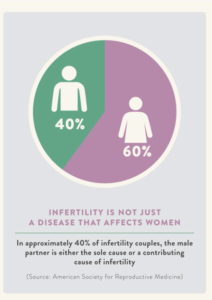 Infertility is common, affecting about 1 in 6 couples. Often, infertility is considered an issue that mostly affects women (defined here as biological females). Women are the ones who carry a pregnancy, give birth to a child, and many assisted reproductive technology (ART) procedures, like in vitro fertilization (IVF), happen to a woman. About half of the time, infertility is attributed to a cause in the female partner. But to imply that men (defined here as biological males) do not face infertility or its challenges is incorrect. After all, about 40% of the time, infertility is attributed solely or in part to the male partner. Many men face infertility in the shadows due to feelings of shame and societal stigma, but this is changing as knowledge of male infertility increases and men feel more comfortable talking about it.
Infertility is common, affecting about 1 in 6 couples. Often, infertility is considered an issue that mostly affects women (defined here as biological females). Women are the ones who carry a pregnancy, give birth to a child, and many assisted reproductive technology (ART) procedures, like in vitro fertilization (IVF), happen to a woman. About half of the time, infertility is attributed to a cause in the female partner. But to imply that men (defined here as biological males) do not face infertility or its challenges is incorrect. After all, about 40% of the time, infertility is attributed solely or in part to the male partner. Many men face infertility in the shadows due to feelings of shame and societal stigma, but this is changing as knowledge of male infertility increases and men feel more comfortable talking about it.
Causes of Male Infertility
Most often, causes of male infertility relate to how the testicles, the reproductive organs that create and store sperm, work. This can lead to improperly formed sperm, lower amounts of sperm (oligospermia), or no sperm at all (azoospermia). Forty percent of the time, the exact cause for a man’s infertility related to sperm formation is not known. Other causes of male infertility include hormone imbalances or blockages/absences of some of the ducts in the male reproductive organs (such as the vas deferens). Lifestyle—such as weight, sleep and exercise habits, medical treatment, medications, substance use—and a man’s age can also affect his fertility.
Genetic Factors and Male Infertility
Genetics can also contribute to male infertility and our understanding of this is growing. Genetic factors are responsible for at least 15% of male infertility. Men with azoospermia, in particular, have about a 25% chance to carry a genetic factor that reduces their fertility. Some men have genetic conditions that are known to cause infertility. This includes having numerical or structural changes in their chromosomes, such as Klinefelter syndrome, or having missing areas (deletions) in their Y chromosome. Another genetic example is cystic fibrosis (CF), an inherited lung condition that can cause a man’s vas deferens ducts to be missing from birth and reduce his fertility. Emerging causes of male infertility are brand-new changes in genes that occur randomly when a couple tries to conceive, and more research to understand this is ongoing.
Genetic testing may help provide answers for a man or couple facing infertility. For example, a chromosome analysis (karyotype) can uncover most numerical and structural changes in a person’s chromosomes. Other genetic tests, such as those that look for several genetic factors that can cause infertility, may also provide answers. If a genetic risk factor is found from one of these tests, ART technologies, such as preimplantation genetic testing (PGT), can offer options to individuals and couples looking to have a biological child. Some of these genetic tests are covered by health insurance, but plans vary. It is important to speak to your healthcare provider and identify any out-of-pocket costs before having tests done.
For detailed information about the genetic causes of male infertility, read more here.
Helping Men with Infertility Out of Shame and Stigma
Feeling ashamed of infertility is common, and particularly so for men. Stereotypically, men often feel stronger societal pressures to appear strong, successful, and simply attack a problem harder to solve it. Ultimately, men with infertility may not feel comfortable expressing the very real and painful emotions they experience. This can leave men more isolated, pulling away from their partners during an already challenging time. But increasingly, men are opening up about their infertility experiences and owning their emotions. Hopefully, society will create safer spaces for men and all facing infertility to share their challenges, freeing up capacity for these individuals to reach out for help if they need it.
To connect in person with others facing infertility, visit the RESOLVE website to search for support groups throughout the U.S.—some groups are specific to men. There are also well-established online communities that may be beneficial.
Speaking to a genetic counselor is a first step to understanding if genetic factors could impact your pregnancy journey, including any related to male infertility.

Deepti is an independent consultant for Sharing Healthy Genes. She is a highly skilled writer and editor with medical communications and marketing experience, which blends with her 20+ years of clinical acumen as a certified genetic counselor in the U.S. and Canada. Deepti has an active consulting business and is an engaged member of the National Society of Genetic Counselors, most recently serving as a 2018-2020 Director at Large. In her downtime, you’ll find Deepti poring over cookbooks, facing down superhero quizzes from her sons, or writing about her family’s foodie gene on her blog.
